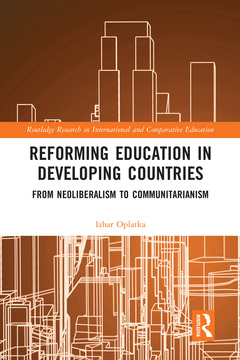Description
Reforming Education in Developing Countries
From Neoliberalism to Communitarianism
Routledge Research in International and Comparative Education Series
Author: Oplatka Izhar
Language: English
Subjects for Reforming Education in Developing Countries:
Keywords
Follow; Public Administration; Public Policy; Reform Implementation; International and Comparative Education; Educational Ideologies; Education Development; Work Habits; Education Reform; Successful Reform Implementation; Communitarianism; International Aid Agencies; Neoliberalism; Vice Versa; Developing Countries; Extra-curricular; Community-based Perspective; Educational Change; Change Implementation; Civic Education; Traditional African Education; Uncertainty Avoidance; Education Reformers; Neoliberal Educational Reforms; School Members; Communitarian Approach; Change Agent; Disengage; School Based Management; Communitarian Scholars; Conferred; Schooling Process; Traditional Society
Publication date: 06-2020
· 15.6x23.4 cm · Paperback
Publication date: 11-2018
· 15.6x23.4 cm · Hardback
Description
/li>Contents
/li>Readership
/li>Biography
/li>
Underpinned in the stream of thought named ?communitarianism?, Reforming Education in Developing Countries argues that developing countries need educational reforms that are tightly entwined into their cultural, social, and organizational contexts. It questions the applicability of neoliberal reforms in developing societies, through an analysis of the main elements of neoliberalism in education. It highlights the critical role of the community and suggests new and alternative lines of thought for the practice of reform initiation and implementation in developing countries.
The book criticizes major neoliberal ideas in education, illuminates the distinctions between current neoliberal reforms and the characteristics of traditional societies, analyzes major educational ideologies in the developed world, and emphasizes the key role of local communities in this world. It proposes a dynamic model of reforming education in these countries that includes three major phases and integrates both modern and traditional (indigenous) educational purposes and values. Evocative ponderings are outlined throughout the book to promote critical thinking and reframing of educators' views towards educational reform and change.
This book will be of great interest to researchers and students in the fields of educational leadership, educational policy, educational change, comparative education, political science, and sociology. It will also appeal to educators, supervisors, and policymakers.
Chapter 1 Why we need an alternative view of reform in developing countries
Chapter 2 The characteristics of neoliberal reforms in educational systems worldwide
Chapter 3 Conceptual models of modernity versus traditionalism: The colorful portrait of the developing world
Chapter 4 The failure of educational reforms in developing countries
Chapter 5 The communitarian perspective and education
Chapter 6 Major educational ideologies in developing countries
Chapter 7 The key role of the local community in educational reform
Chapter 8 Reform implementation in practice
Chapter 9 Reform management in the school
Chapter10 Towards a new conceptualization of education reforms in developing countries
Epilogue
Reference
Izhar Oplatka is Professor of Educational Administration and Leadership at the School of Education, Tel Aviv University, Israel, and Head of the Department of Educational Policy and Administration.




